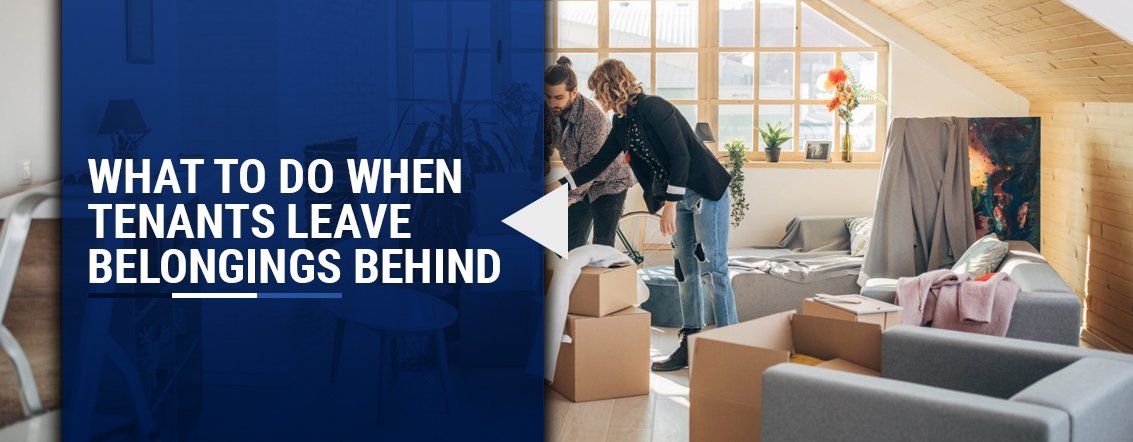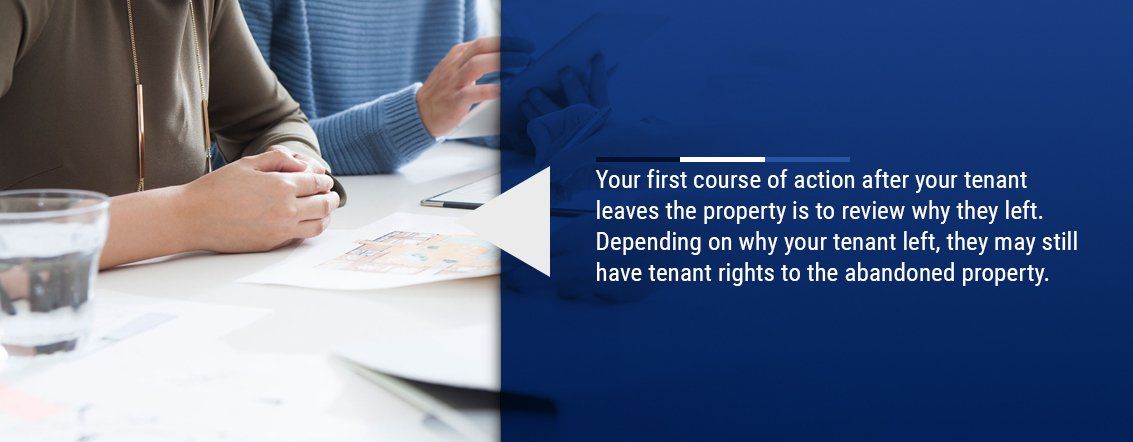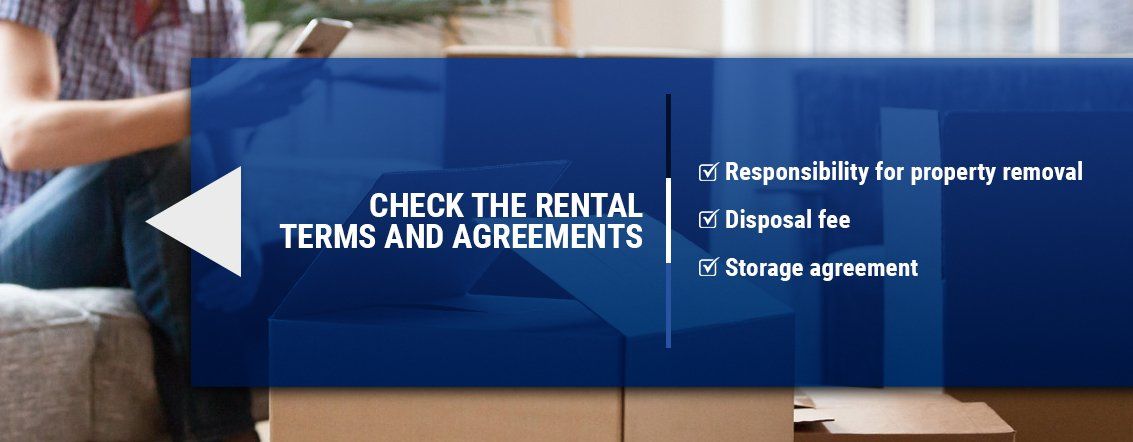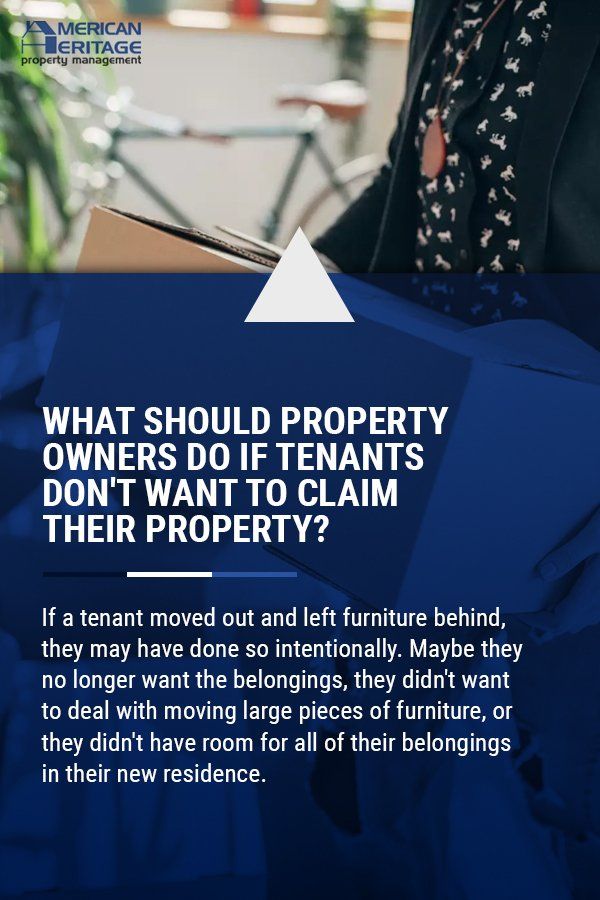What to Do When Tenants Leave Belongings Behind

What do landlords do when a tenant leaves property behind in a rental? You may think a landlord is free to dispose of any leftover belongings or furniture left behind by a former tenant, but the outcome of a tenant abandoning their personal property isn't always that simple.
What should you do if your tenant left belongings behind after moving out? Laws about a landlord's responsibilities can be complicated, which is why many landlord's may not know what to do when a tenant leaves belongings behind.
While you may be tempted to throw everything out and move on, this may not be the best solution for you. Instead, you'll need to take some legal steps, and since your tenant left abandoned property behind, they may owe you money.
Know the steps involved, such as alerting your tenant about their abandoned property and filing with law enforcement for removal of property. Whether you're currently dealing with belongings left behind by a tenant or you want to know what to do if you find yourself in this situation in the future, as a landlord, you need to know what to do if a tenant leaves their property behind.
Why Did the Tenant Leave?
Your first course of action after your tenant leaves the property is to review why they left. Depending on why your tenant left, they may still have tenant rights to the abandoned property. Before you take any action, ensure you know the proper way to proceed depending on the tenant's reason for leaving:
- Tenant's lease ended: Did the tenant's lease end before they moved out? If a lease period ended, landlord rights to abandoned tenant property in most states include disposing of the belongings.
- Tenant received a lease termination notice: Did you serve your tenant a termination notice of the lease? If your tenant left on time, you have the right in most states to dispose of the tenant's abandoned belongings.
- Tenant left without notice: Did your tenant leave without notifying you? If so, this tenant may still have rights to their abandoned belongings. Check the local state laws before you sell or get rid of any of your tenant's property.
- Tenant was evicted: Was your tenant evicted and left belongings behind? If you evicted your tenant, you may need to ensure that they receive their belongings. Usually, evictions are completely handled by local law enforcement. This includes property removal and determining what property you may sell to recoup any unpaid rent.
Before you begin removing your previous tenant's property, check your rental terms and agreements, along with your state laws and local laws that cover property, tenants' rights and landlord rights to abandoned tenant property. State and local laws should inform you about the proper procedures for handling abandoned tenant property in your area.
Check the Rental Terms and Agreements
Did the tenant sign anything about their belongings? No matter how thorough your tenant screening process, you may still run into issues with your tenant, including abandoned property. Check your rental agreement for terms that refer to this sort of situation. Your contract may entitle you to a fee for disposing of this previous tenant's personal property, or your contract may not address this situation at all.
If this situation isn't already addressed in your lease agreement, consider adding a clause to your rental contract about belongings being left behind in the rental property by the tenant.
Packing is a tedious chore during a move, and sometimes, tenants decide they don't need to clean up their trash or take all of their belongings with them, especially if there are items they no longer want. Though abandoning small belongings, furniture or even cars may not seem like a big deal to your tenant, it can become a costly issue for a property owner. This is especially true for large items that are more expensive to dispose of.
What should be included in your clause about tenant abandoned property?
- Responsibility for property removal: A statement that the tenant is responsible for the removal of their belongings or the belongings will be disposed of.
- Disposal fee: A statement about a disposal fee for a large amount of trash or for any tenant property left behind when the tenant moves out.
- Storage agreement: An optional agreement to keep the furniture on your property for an amount of time. This gives the former tenant a grace period before they must return for their belongings.
You can speak with a lawyer for legal advice about what to include in this clause. Even if it seems a little excessive to include this clause in your rental agreement, you'll enjoy the peace of mind of knowing that you're protected if faced with this expensive situation.
Check Local and State Laws Regarding Property Owner and Tenant Rights
Give the Tenant Legal Notice About the Belongings They Left Behind
1. What Should Be Included in the Notice
What should this notice to your former tenant include?
- A description of the property that was left behind
- The location where their property will be stored
- The estimated value of their property
- The deadline by which the tenant must retrieve their property, usually indicated by your state or local laws
- The steps you will take if the property is not retrieved by the deadline
- A request for a return receipt
Ensure all of this information is included before you sent out the notice to your former tenant.
2. How to Create an Inventory of the Abandoned Property
To write a notice for abandoned property, you'll need to document information about the abandoned belongings. Bring an objective observer with you while you take inventory of the former tenant's property. Having an objective observer will protect you in the event that any fraudulent charges are brought against you.
You may also want to bring a camera to take pictures and videos of the items the tenant left, which can be helpful documentation if the situation escalates. Additionally, make sure you don't open any property that is locked until a definite decision is made on how the property will be handled.
As the property owner, the responsibility of creating an inventory of all the items a tenant left behind falls to you. You'll need a written or photographic record of every item left behind. Ideally, you should record the inventory both photographically and in writing. Record as much detail as you can.
3. What If the Former Tenant Claims They Didn't Receive the Notice?
What Should Property Owners Do If the Tenant Wants to Claim Their Property?
What Should Property Owners Do If Tenants Don't Want to Claim Their Property?
Removing or Selling the Tenant's Belongings
1. Dump Trash
2. Keep Items
3. Hold a Sale
In many states, property owners are required to organize a public sale of the former tenant's abandoned belongings. You can work with a local bond agency to set up the sale, and you can also typically use the proceeds to recoup the expenses of advertising, storing and selling the items. Check your state laws to determine whether you can keep the rest of the profits from the sale or whether you need to give the remaining proceeds to the state.
If you aren't required to hold a public sale in your state, you can sell the abandoned belongings on your own and keep the profits.
There are exceptions to what items you can get rid of. The following are items you do not have to worry about removing:
- Vehicles: If a tenant moved out and left a car, the vehicle would be considered abandoned and should be reported to local law enforcement. They will handle the filing and removal of the vehicle.
- Permanent fixtures: If permanent fixtures were among the belongings a tenant left behind on the rental property, they can be considered part of the property and yours to keep. Permanent fixtures include items like lights or built-in bookshelves, and you don't have to report them. If you don't approve of a permanent fixture, you can deduct the cost of its removal from your tenant's security deposit.
If you have any doubts about what you are not allowed to remove, review your state and local laws or seek legal advice.
Work With a Property Management Service
A property management service can help property owners handle a tenant's abandoned property. Property managers are experienced in dealing with tenant turnover, so they're familiar with the process of moving a tenant out and tackling the issues that can arise.
When you work with a property management service, the process of handling abandoned tenant belongings is much easier.
Contact us at American Heritage Property Management for property management service inquiries.








